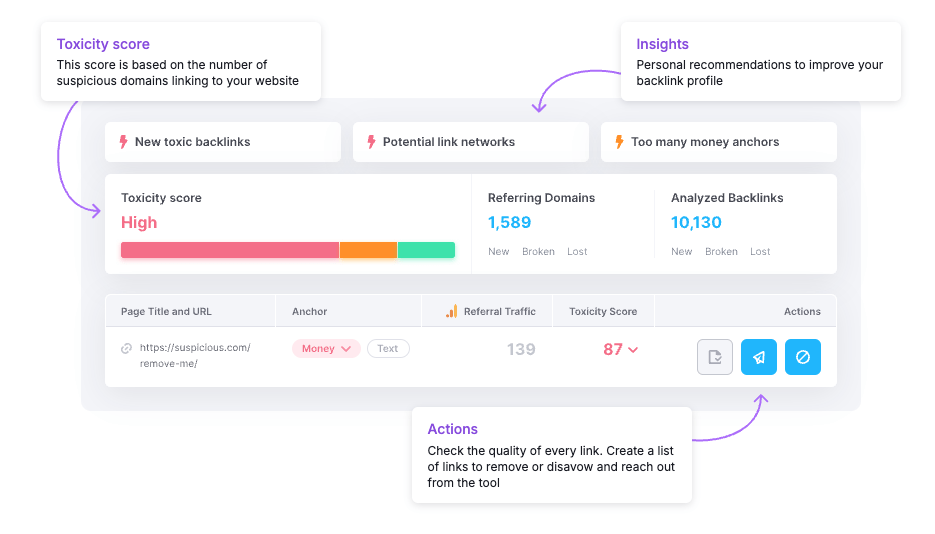How to Increase Domain Authority in 3 Steps


David Miedzianowski
This post was originally published in July 2024 and has been updated for accuracy and comprehensiveness.
Since 2020, Google has released multiple search core updates — making search more volatile than ever. For many business leaders, this causes a lot of anxiety around increasing and maintaining a high ranking in search algorithms. In this post, we’ll share how to increase domain authority in three steps that will ultimately improve your overall search performance.
But what even is domain authority and does it even matter in the long run?
In this post, we’ll discuss:
- Domain authority meaning
- Does domain authority matter?
- What is a high-ranking domain score?
- Ensure SEO optimization across the site
- Mastering high-authority link-building
- Improve social proof

B2B Marketing Strategy Framework: The Ultimate Guide to Business Branding
Looking to create a strong B2B marketing strategy? This guide walks you through planning a data-driven marketing campaign.
Domain authority meaning
Domain authority is a score that predicts how likely a website will rank high for its targeted keywords on a search engine results page (SERP). This metric was developed by Moz and scales from 1 to 100 — where 100 is deemed the most credible site.
To rank high on Google, you need to demonstrate that your landing page is relevant to the search query and that your site is authoritative to provide accurate and trustworthy information. In short, the domain authority score allows you to estimate how influential your site is.
EBQ Tip: For a more robust overview of search engine optimization (SEO), check out “SEO Basics Checklist for Blog Posts: How to Improve Your Ranking and Surpass Your Competitors [+ PDF]”. There, you’ll find a more in-depth explanation of Google’s E-E-A-T and how to optimize a landing page for the best results.
Does domain authority matter?
While domain authority is not a ranking factor, it is still important to understand how search-competitive your site is compared to your competitors.
Therefore, tracking your domain authority on SEO tools — such as Moz — is a good idea to understand how fruitful your SEO efforts have been.
What is a high-ranking domain score?
Generally, we break down domain authority scores into the following ranges:
0-10: Very Low
We typically only see this kind of DA score for websites that were recently built. If your website is well-established but still has this low of a score, it is seen as unreliable and likely has few, if any, high-authority backlinks.
11-25: Low
If your domain authority score is in this range, it means you are at least registered with Google, but you have little to no history of SEO performance. There is still much work to be done in terms of ranking for keywords and accumulating quality backlinks.
26-40: Average
A website with a domain authority score in this range has the beginnings of a well-established backlink profile, but it can clearly be improved upon both in quantity and quality.
41-60: Good
This score range indicates a high-authority site. It likely has a well-thought-out SEO strategy incorporated into it, and with a few more tweaks, it can easily become a source of authority and thought leadership within its industry.
61-80: Great
A website with a score in this range has a robust amount of high-quality backlinks and is typically able to rank for the most sought-after keywords within its specific industry. It contains highly trusted, relevant content complete with popular, commonly searched keywords.
81+: Exceptional
Scores in this range typically belong to large, globally known brands or organizations. This is generally reserved for powerhouse brands and websites like Google, YouTube, or Wikipedia.
Keep in mind that many factors influence a site’s domain authority score; the domain authority score won’t paint a full picture of a brand’s search competitiveness potential. For example, a brand new site that just launched will almost certainly score a near zero in domain authority — even if it is technically optimized.
Now that you understand how the domain scoring system works, let’s discuss the three tactics to increase your domain authority score:
- Ensure SEO optimization across the site
- Mastering high-authority link-building
- Improve social proof

Subscribe to EBQ's Bimonthly Newsletter

Subscribe to EBQ's Bimonthly Newsletter
1. Ensure SEO optimization across the site
As you may know, you need to optimize every page on your website to ensure high SERP rankings. With Google continually refining its penalty system to ensure fair ranking, we recommend focusing on white-hat SEO practices. White-hat SEO practices adhere to Google’s recommendations.
Some of the SEO basics you need to be familiar with include:
- Using only one h1 on your entire page
- Utilizing descriptive anchor links
- Not relying on AI to write your content
- Including 3-5 internal and external links
- Writing over 300 words per page
For many, writing SEO-friendly content can be quite challenging. Not only do you have to write informative content, but you also have to optimize your page to make sure it gets ranked. If you are having issues with search engine optimization, EBQ offers content marketing services. Our content writers will take the time to understand your brand and craft a voice that provokes thought leadership.
2. Mastering high-authority link-building
Link building is the process of acquiring more external sites to link to your website. These hyperlinks — also known as backlinks — are often seen as a vote of confidence, which is how Google quickly deems how authoritative your site is.
Backlinks were first announced as a Google ranking factor in 1998 through their PageRank release. In theory, you gain high-quality backlinks by creating high-quality content. You can accelerate your content’s impact by implementing an outreach program — such as guest posting.
Since SEO is a long-term strategy, many marketers try to expedite the ranking process by buying low-quality backlinks (often referred to as “spam backlinks”). Spam backlinks are toxic links artificially created by untrustworthy sites. In their 2012 Penguin update, Google explicitly announced that they would actively penalize those who purchased spam backlinks.
So how do you check for spam backlinks? By utilizing a backlink scraping tool — such as Semrush’s Backlink Analytics. After auditing your backlinks, you can perform one of three actions:
- Whitelist: You have verified that the source seems trustworthy and are satisfied with allowing them to link to you
- Remove: You would like the site to remove your link, so you will reach out to the source manually
- Disavow: You bypass the removal process and upload a list of websites for Google — telling Google to ignore all links coming from the site

EBQ Tip: Semrush’s backlink tool allows you to export a disavow file. Make sure to upload this list to Google Search Console.
3. Improve social proof
Finally, you need to leverage social proof to increase your domain ranking. Social proof describes how someone can be influenced to purchase a product or service based on how their peers respond to the solution.
For example, have you ever wanted to try out a new restaurant in town because of its high Google reviews? If so, you were influenced by positive reviews to convert customers.
Gaining reviews from third-party sites improves your site ranking because these third-party sites will often link back to your website — thus helping with your backlinking project. People tend to trust third-party reviews because these review sites have policies in place to prevent business owners from manipulating their reviews.

B2B Marketing Strategy Framework: The Ultimate Guide to Business Branding
Looking to create a strong B2B marketing strategy? This guide walks you through planning a data-driven marketing campaign.
Boost Your Domain Authority With Ease
While Domain Authority is not considered an official ranking factor, it is still helpful to keep track of your domain authority score. That way, you can get a more objective view of how authoritative your site is compared to your competitors.
In summary, you can increase your domain authority score by:
- Ensure SEO optimization across the site
- Mastering high-authority link-building
- Improve social proof
If your content is struggling to rank, consider partnering with a content marketing team. At EBQ, we specialize in writing high-quality, SEO-optimized content. For more information, visit our content marketing services page.
About the Author:
David is a Revenue Cycle Consultant at EBQ who leverages his experience as a former VP of Sales to align sales and marketing teams for measurable results. With expertise in B2B digital marketing and demand generation, he helps businesses optimize strategies for long-term success.
